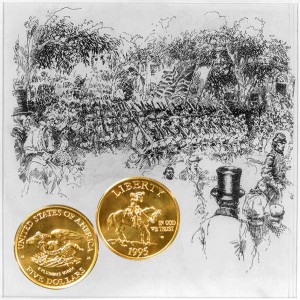Today, the Civil War Commemorative Gold Five Dollar Coin remembers the origin of the Battle Hymn of the Republic 154 years ago.
After traveling with friends to view the troops, Julia Ward Howe woke in the wee hours of November 19, 1861 to write the verses of the poem that became the Battle Hymn.
In her book, Reminisces: 1819-1899, Julia Ward Howe described her day and her inspiration for the poem.
=====
It would be impossible for me to say how many times I have been called upon to rehearse the circumstances under which I wrote the ” Battle Hymn of the Republic.”
I have also had occasion more than once to state the simple story in writing. As this oft-told tale has no unimportant part in the story of my life, I will briefly add it to these records.
I distinctly remember that a feeling of discouragement came over me as I drew near the city of Washington at the time already mentioned.
I thought of the women of my acquaintance whose sons or husbands were fighting our great battle; the women themselves serving in the hospitals, or busying themselves with the work of the Sanitary Commission.
My husband, as already said, was beyond the age of military service, my eldest son but a stripling; my youngest was a child of not more than two years.
I could not leave my nursery to follow the march of our armies, neither had I the practical deftness which the preparing and packing of sanitary stores demanded.
Something seemed to say to me, “You would be glad to serve, but you cannot help anyone; you have nothing to give, and there is nothing for you to do.”
Yet, because of my sincere desire, a word was given me to say, which did strengthen the hearts of those who fought in the field and of those who languished in the prison.
We were invited, one day, to attend a review of troops at some distance from the town.
While we were engaged in watching the maneuvers, a sudden movement of the enemy necessitated immediate action.
The review was discontinued, and we saw a detachment of soldiers gallop to the assistance of a small body of our men who were in imminent danger of being surrounded and cut off from retreat.
The regiments remaining on the field were ordered to march to their cantonments.
We returned to the city very slowly, of necessity, for the troops nearly filled the road.
My dear minister was in the carriage with me, as were several other friends.
To beguile the rather tedious drive, we sang from time to time snatches of the army songs so popular at that time, concluding, I think, with “John Brown’s body lies a-mouldering in the ground; His soul is marching on.”
The soldiers seemed to like this, and answered back, “Good for you!”
Mr. Clarke said, “Mrs. Howe, why do you not write some good words for that stirring tune?”
I replied that I had often wished to do this, but had not as yet found in my mind any leading toward it.
I went to bed that night as usual, and slept, according to my wont, quite soundly. I awoke in the gray of the morning twilight; and as I lay waiting for the dawn, the long lines of the desired poem began to twine themselves in my mind.
Having thought out all the stanzas, I said to myself, “I must get up and write these verses down, lest I fall asleep again and forget them.”
So, with a sudden effort, I sprang out of bed, and found in the dimness an old stump of a pen which I remembered to have used the day before.
I scrawled the verses almost without looking at the paper. I had learned to do this when, on previous occasions, attacks of versification had visited me in the night, and I feared to have recourse to a light lest I should wake the baby, who slept near me.
I was always obliged to decipher my scrawl before another night should intervene, as it was only legible while the matter was fresh in my mind.
At this time, having completed my writing, I returned to bed and fell asleep, saying to myself, ” I like this better than most things that I have written.”
=====
In February 1862, the Atlantic Monthly printed her poem on its front page:
=====
BATTLE HYMN OF THE REPUBLIC.
Mine eyes have seen the glory of the coming of the Lord:
He is trampling out the vintage where the grapes of wrath are stored;
He hath loosed the fateful lightning of His terrible swift sword:
His truth is marching on.
I have seen Him in the watch-fires of a hundred circling camps,
They have builded Him an altar in the evening dews and damps;
I can read His righteous sentence by the dim and flaring lamps:
His day is marching on.
I have read a fiery gospel writ in burnished rows of steel:
“As ye deal with my contemners, so with you my grace shall deal;
Let the Hero, born of woman, crush the serpent with his heel,
Since God is marching on.”
He has sounded forth the trumpet that shall never call retreat;
He is sifting out the hearts of men before His judgment-seat:
Oh, be swift, my soul, to answer Him! be jubilant, my feet!
Our God is marching on.
In the beauty of the lilies Christ was born across the sea,
With a glory in his bosom that transfigures you and me:
As he died to make men holy, let us die to make men free,
While God is marching on.
=====
The Civil War Commemorative Gold Five Dollar Coin shows against an artist’s image of a troop review published in “Julia Ward Howe,” circa 1916.
